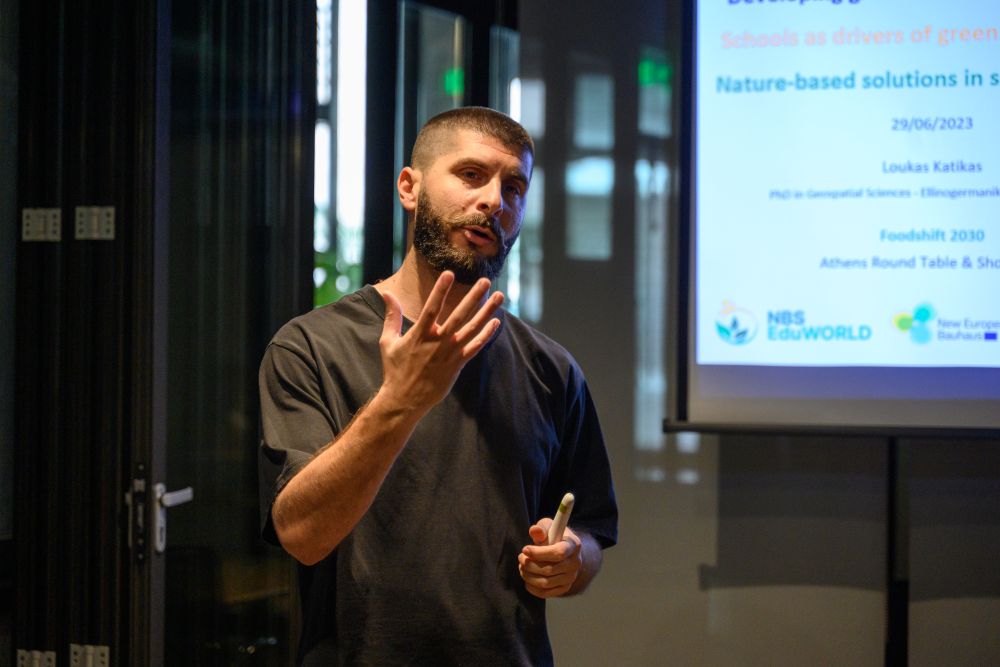
News
Schools as innovation hubs for the green transition – How Nature – based Solutions can lead skill development for sustainable communities
15 August 2023
Schools and places of learning are an integral part of youth development and are thus important to reach young minds and spark green transitions. In order to tap into this potential for community building for NBS, Ellinogermaniki Agogi recently organized plenary sessions focusing on how schools can be transformed into NBS Living Labs, acting as innovation hubs for the green transition.
The plenary sessions were part of the Foodshift 2030 Summer School organised in Marathon, Greece. The “Schools as sites for Food System Transformation” Summer School aimed to familiarise participants with the Open Schooling and Living Labs approach that provides a powerful framework for school heads and teachers to engage, discuss and explore how schools can become innovation incubators and accelerators.
NBS EduWORLD participated in the Summer School, conducting an extensive presentation of the project, individual interviews and round tables, and a co – design workshop on how the NBS Living Labs can act as enablers of the Whole – School Approach. The applied NBS Living Labs methodology aims to address the urgent challenges of climate change and environmental degradation that the local communities are facing nowadays. Moreover, looking from an educational perspective, the NBS Living Labs offer the opportunity for applied learning and cross - cutting skills development and competence – based curricula for students and teachers upon different NBS challenges.
The Summer School comprised of primary and secondary school teachers with a strong focus on Learning for Sustainability Education, NBS Expert Teachers as winners of the ‘Nature - based Solutions in Education Competition for Teachers 2023’ organized during the 2023 STEM Discovery Campaign, education policymakers, environmental education coordinators from Municipalities, university researchers, environmental experts and entrepreneurs focusing on the development of STEM activities related to climate adaptation.
With such a diverse and interesting group of participants, the knowledge-sharing discussions, and the co-design workshop were an overwhelming success, resulting in a truly innovative and inspiring vision of the schools as NBS Living Labs of the future. Participants enthusiastically shared their ideas, their concerns and their hopes to enhance LfS education. Having gained knowledge on NBS and the NBS Living Labs vision, they collaborated in groups, bringing together their diverse ideas, perspectives, expertise, and creativity to imagine their NBS – based dream school. The workshop fostered some knowledge – sharing atmosphere, empowering the participants to design the schools of the future by integrating a rich tapestry of formal, non-formal, and informal NBS concepts and activities. This inclusive and participatory approach ensured that every aspect of the school experience was considered, from academic excellence to the use of innovative pedagogies and cross – cutting STEM concepts. The outcomes of the workshop not only laid the groundwork for tangible NBS implementation in schools but also ignited a sense of hope and optimism for the potential of mainstreaming NBS in LfS education, where the schools become incubators of innovation and experimentation for the local communities and the broader society.
This workshop is one of a series of upcoming events aimed to address the subject of NBS in Education and Community Building.
Learn more about the event and the potential of NBS education for skill development here.
Foodshift 2030 EduWORLD by "Ellinogermaniki Agogi", licensed under some rights reserved, for promotion
All news

Funded by the European Union. Views and opinions expressed are however those of the author(s) only and do not necessarily reflect those of the European Union or the European Commission. Neither the European Union nor the granting authority can be held responsible for them.
